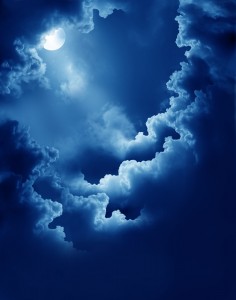By the light of the moon
By the light of the moon
By the light of the moon
-
Hannah Fielding
-
Hannah Fielding
 Moonlight – an element of nature about which poets have waxed lyrical for centuries. For Charles Baudelaire, the moon was sad: ‘Earthward she lets a furtive tear-drop flow’. For Robert Graves, it was unkind: ‘The cruel Moon hangs out of reach/Up above the shadowy beech’. For Emily Bronte, it made ‘All soft and still and fair’. For Thoreau, ‘She’s mistress of the night’. The different interpretations strike a chord in me, for I think moonlight can create very different effects depending on the setting and the mood.
Moonlight – an element of nature about which poets have waxed lyrical for centuries. For Charles Baudelaire, the moon was sad: ‘Earthward she lets a furtive tear-drop flow’. For Robert Graves, it was unkind: ‘The cruel Moon hangs out of reach/Up above the shadowy beech’. For Emily Bronte, it made ‘All soft and still and fair’. For Thoreau, ‘She’s mistress of the night’. The different interpretations strike a chord in me, for I think moonlight can create very different effects depending on the setting and the mood.
In my novel The Echoes of Love, Paolo and Venetia have different impressions of Venice by moonlight:
Paolo had turned away to stare at the dazzling view that lay in front of them. ‘None of the works of art of man equal the sight of Venice by the Grand Canal when the moon is up,’ he murmured, as though to himself, his attention riveted on the endless line of palazzi, the ghostly whiteness of their marble fronts rejuvenated by night. ‘For a few hours the moon hides the city’s frightful rotting façades behind a transparent silver mask, giving her some fairylike quality, a sort of innocence. Looking like this, one would never guess at the decay which gnaws at her core.’…
His words echoed Venetia’s thoughts, but not quite. Ever since she could remember, Venice in moonlight had a strange magical power over her. She didn’t see the decay, only the enchantment.
Thus the moonlight is like the masquerade mask that the city dons, only Paolo sees beyond the mask and Venetia does not desire to. For Paolo, the moon is deceptive; for Venetia it is alluring.
Later in the book, when the couple are holidaying together on Sardinia, the moonlight takes on a different feel:
After dinner, Paolo walked Venetia back to La Sirena. The moon was shining, the stars winking at them happily in the navy velvet canopy above. The sea was like a table of amethyst liquid, glistening with moonlight. In the distance, the Port of Santo Stefano wore her lights as a woman wears her diamonds, sparkling and glowing against the darker bulk of the hills behind. There was something infinitely peaceful and refreshing now that the sun had gone down; the air was as wine – cool and reviving, intoxicating the lovers.
Now the light is not concealing; it is calming. The lovers project their own feelings onto the setting; they interpret the light differently now that they are happy.
Even when the light is fading it can be moving and inspirational:
Walking now on the wet sand by the sea’s edge, Venetia felt the night-cooled water fresh over her toes, a delicious sensation. The wind touched her cheek and she looked up quickly at the greyish light. The moon was fading but was still flooding the dark glassy surface of the water with metallic light, creating a silvery staircase leading from their feet all the way to the moon. She took out the clips that held her hair up, her eyes lingering on the reflected image on the sea. ‘It’s so beautiful,’ she sighed.
The moon has an almost fairytale feel, calling to mind Paolo’s words: ‘If I had it my way, I would take you to my palace in the moon, where the stars shine always bright, and the angels sing all night a beautiful lover’s hymn.’ When Venetia asks, ‘What about the sun? Do the angels also sing there in daytime?’, he replies, ‘My palace in the moon knows only night. Sunshine would be too dazzling and would eclipse the ethereal magic and poetry of the moonlight.’
The ethereal magic and poetry of the moonlight – that is what I see when I look at the moon. There is something so stirring about the sight of it. It can guide, it can comfort, it can chill, it can melt. It is an enigma, ever-changing and powerful. One thing is certain: when I am writing a scene situated outside at night, I am always be careful to consider the phase of the moon, its placement in the sky, its visibility and, most importantly, whether the silvery light it casts is illuminating and beautiful, or pale and cold.